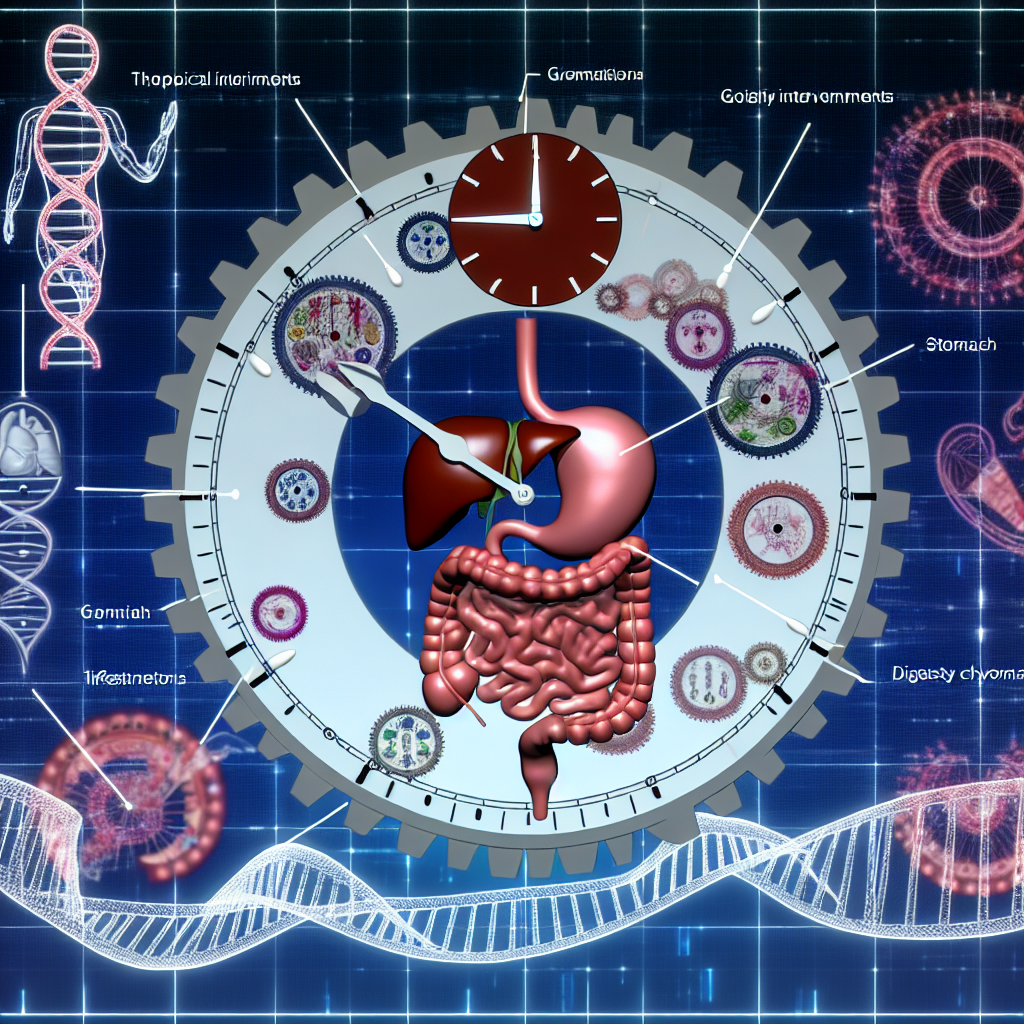Here is the clean, expanded, and formatted blog post:
Unlocking the Power of Digestive Chronobiology: Timing Your Way to Better Gut Health
In the pursuit of better gut health, an emerging field known as digestive chronobiology is beginning to gain traction among healthcare professionals and wellness enthusiasts alike. Rooted in the broader science of chronobiology—the study of biological rhythms—digestive chronobiology specifically addresses how the timing of physiological and dietary processes affects the digestive system and, consequently, overall health.
The human body operates according to a circadian rhythm: an internal 24-hour clock influenced largely by light and darkness, and regulated by the brain’s suprachiasmatic nucleus (SCN) located in the hypothalamus. However, what’s becoming increasingly clear is that this rhythm doesn’t solely impact our sleep-wake cycles—it also governs the function of various organ systems, including the gastrointestinal tract. The digestive system itself follows its rhythm, coordinating digestive enzyme release, gastric emptying, nutrient absorption, and gut microbiota activity in accordance with this natural timing.
Researchers have found that disrupting these rhythms through inconsistent eating schedules, late-night meals, or shift work can lead to gastrointestinal disturbances. These include indigestion, irritable bowel syndrome (IBS), altered gut microbiota diversity, and even metabolic disorders like obesity and Type 2 diabetes. Simply put, when and how we eat may be just as important as what we eat.
This understanding opens an exciting avenue for timing natural and herbal treatments for gut health for amplified effectiveness. Traditional methods such as intermittent fasting, herbal teas, and plant-based supplements might yield significantly enhanced outcomes when synchronized with the body’s digestive clock.
Still relatively new, digestive chronobiology already shows far-reaching implications. As our understanding of the gut-brain axis and microbiome deepens, timing-based therapies are poised to revolutionize natural digestive care. For those seeking non-pharmaceutical solutions, mastering digestive chronobiology offers a smart, science-backed approach to gut wellness.
What Science Says: Medical Studies Proving the Timing-Gut Health Connection
The relationship between circadian rhythms and gastrointestinal health is increasingly supported by scientific evidence. One key study published in Cell (Thaiss et al., 2014) showed that the gut microbiota undergoes daily cycles in both composition and function, heavily depending on feeding times. Disrupting these rhythms led to microbial imbalances and metabolic complications in lab animals.
Another breakthrough finding, featured in Science Translational Medicine, confirmed that intestinal epithelial cells—which are essential for absorbing nutrients—operate on their own circadian clocks. When these internal clocks were thrown off, digestion and absorption were negatively impacted, highlighting the vital role of timing in gut function.
This is where time-restricted eating (TRE), a type of intermittent fasting, has proven effective. A 2019 study in Cell Metabolism found participants who ate during an 8-hour window experienced better insulin responses, reduced blood pressure, and fewer digestive symptoms like bloating.
Timing Your Herbs Right: Morning to Evening for Maximum Digestive Impact
Combining traditional herbal medicine with digestive chronobiology offers exciting synergies. For example, ginger (Zingiber officinale), known for reducing nausea and aiding digestion, may work best in the morning when gastric movement naturally peaks. Morning consumption can improve gut motility and optimize the herb’s anti-inflammatory and anti-emetic effects.
In comparison, calming herbs like chamomile and valerian root may be more effective in the evening. These botanicals interact favorably with the parasympathetic “rest-and-digest” system, helping the body relax and promoting optimal digestion during sleep hours.
Another powerful molecule to consider is melatonin. Though commonly known for regulating sleep, it’s also produced in large amounts within the gut itself. According to research in Nutrients (2020), melatonin helps repair gut lining and reduce inflammation. When taken at night, it may enhance gastrointestinal healing and overall digestive harmony.
Tech Meets Nature: Using Wearables for Personalized Timing Interventions
The world of technology is quickly catching up to the science of digestive chronobiology. New wearable devices and mobile apps can track your body’s natural rhythms by monitoring data points like body temperature, light exposure, and physical activity. These tools allow users to receive personalized recommendations for when to eat and supplement, optimizing digestive and metabolic outcomes.
This approach aligns with findings from a 2018 study in Chronobiology International, which concluded that customized, rhythm-based nutritional strategies were significantly more effective than standard dietary approaches in improving digestion and gut health—especially in individuals with irregular schedules such as shift workers or frequent flyers.
Conclusion: It’s Not Just What You Do—It’s When You Do It
Digestive chronobiology is an innovative and promising frontier in natural gut health solutions. By aligning your meals, fasts, and herbal treatments with your body’s internal clock, you can unlock their fullest potential. Synchronizing ginger with morning motility, enjoying chamomile in the evening, or leveraging melatonin at night all enable a more holistic and effective path to digestive wellness.
This integrative approach—where ancient herbal knowledge meets cutting-edge chronobiological science—represents a major leap ahead in how we understand and support our gut. As evidence continues to grow, it’s clear that for optimal digestive health, timing really is everything.
Concise Summary:
Digestive chronobiology is an emerging field that examines how the timing of physiological and dietary processes affects the digestive system and overall health. By aligning meals, fasts, and herbal treatments with the body’s internal clock, individuals can unlock the full potential of natural gut health solutions. This integrative approach combines ancient herbal wisdom with cutting-edge chronobiological science, offering a smart, science-backed path to better digestion and wellness.
References:
1. Thaiss, C. A., Zeevi, D., Levy, M., et al. (2014). Transkingdom control of microbiota diurnal oscillations promotes metabolic homeostasis. Cell, 159(3), 514–529. https://doi.org/10.1016/j.cell.2014.09.048
2. Panda, S., et al. (2017). Circadian clock proteins regulate the daily rhythm of human intestinal nutrient absorption. Science Translational Medicine, 9(390), eaag2503. https://www.science.org/doi/10.1126/scitranslmed.aag2503
3. Wilkinson, M. J., et al. (2019). Ten-hour time-restricted eating reduces weight, blood pressure, and atherogenic lipids in patients with metabolic syndrome. Cell Metabolism, 29(1), 67-76.e5. https://doi.org/10.1016/j.cmet.2018.11.004
4. Claustrat, B., Leston, J. (2020). Melatonin: Physiological effects in humans. Nutrients, 12(12), 3475. https://www.mdpi.com/2072-6643/12/12/3475
5. Boivin, D. B., Boudreau, P. (2018). Impacts of shift work on sleep and circadian rhythms. Chronobiology International, 35(8), 1045-1058. https://doi.org/10.1080/07420528.2018.1466796

Dominic E. is a passionate filmmaker navigating the exciting intersection of art and science. By day, he delves into the complexities of the human body as a full-time medical writer, meticulously translating intricate medical concepts into accessible and engaging narratives. By night, he explores the boundless realm of cinematic storytelling, crafting narratives that evoke emotion and challenge perspectives.
Film Student and Full-time Medical Writer for ContentVendor.com




